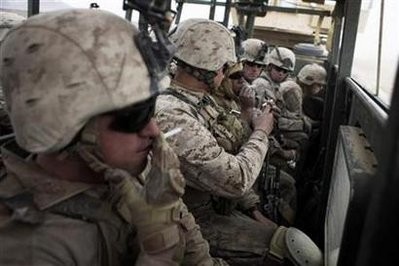Beefed up U.S. security in southern Afghanistan will make it difficult for the Taliban to reintroduce forces into their Kandahar stronghold when the spring fighting season begins, a top general said on Tuesday.
General James Mattis, head of U.S. Central Command that oversees American forces in Afghanistan, also said the war against Taliban militants was no longer a "strategic stalemate" and "the enemy is now in a worsening situation."

Mattis, testifying before the Senate Armed Services Committee, said General David Petraeus, the head of U.S.-led forces in Afghanistan, had deployed a U.S. Army surveillance brigade to monitor the area between Kandahar and the Pakistani border to guard against infiltration.
"In other words, it's not just a thoroughfare," he said. "The enemy's going to have a very difficult time come spring when they try to reintroduce their troops back into the area -- Helmand, Kandahar -- where they've lost the initiative."
The Kandahar area is the Taliban's birthplace and is considered its home turf. International forces moved to take control of the area last year once additional U.S. troops authorized by President Barack Obama arrived in the country.
U.S. lawmakers expressed frustration over Pakistan's failure to shut down safe havens in its territory used by the Afghan Taliban and al Qaeda. Mattis acknowledged the situation is "not perfect" but defended the actions Pakistan has taken.
"It's not that the Pakistanis have done nothing here," he said. "They've lost thousands of troops. They've had almost 30,000 of their civilians murdered by these enemies."
'RECONCILIATION, REINTEGRATION'
Mattis and Admiral Eric Olson, head of the U.S. Special Forces Command, both indicated the war needed to be solved via political reconciliation rather than on the battlefield.
"First point, make certain the enemy doesn't think they're going to win. That's what we've had to reverse in the last year," Mattis said. "Then the diplomats have more of a chance to get these other efforts -- reconciliation, reintegration -- going."
With the U.S. Congress in a budget-cutting mood as it works on a resolution to fund the government for the rest of the fiscal year, both military leaders warned that cuts to their funding would have an impact on the war effort.
"Absolutely it will," Mattis said. "We've just in the last year and a half gotten the resources, personnel, training ... correct. And we are right now approaching the time when we're going to see the results of all that. We're already seeing the results but they're going to be very telling shortly."
Olson said: "In Afghanistan, Special Operations forces are operating at the edge of their people and at the edge of their budget and a reduction in either would be detrimental to the effectiveness."
























